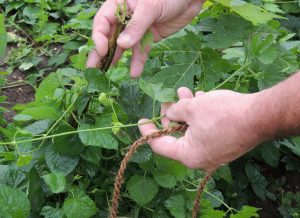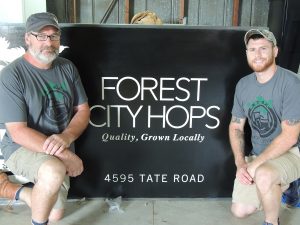Entrepreneurs’ Forest City Hops harvest stays close to home
By Lynne Conner for Chronicle Media — September 26, 2018
Shane Johnson, co-owner of Forest City Hops shows how a hops vine is trained around a coconut fiber cord. (Photo by Lynne Conner / for Chronicle Media)
The fall harvest in Illinois typically brings to mind combines collecting corn in the fields, families picking apples in a local orchard and the excitement of young children on a trip to the pumpkin patch.
But for two local farmer entrepreneurs, harvest season means bringing in over 400 pounds of hops.
Joe Girgenti and Shane Johnson, co-owners of Forest City Hops (FCH) in northwestern Winnebago County are only in their second season as hops farmers, but their produce is already a highly popular ingredient for local brewing companies.
“Shane had been experimenting with growing different hops varieties for about two years. We found that hops grow well in this area and thought we would take a shot at growing them commercially,” Girgenti said.
Currently, the hops are grown on 1/8 of an acre, the “small yard”, on Johnson’s property. FCH recently purchased an additional adjacent 40 acres (the “big yard”) which brings their total acreage to 48.
“We’re not able to plant hops on all 48 acres, because the ground needs to be flat and have good drainage,” Girgenti said. “Our future plans are to get 20 acres up and growing, so we can supply and Rockford area and beyond with locally grown hops.” Girgenti and Johnson call this concept “field to pint” farming.
The Forest City Hops farm is hard to miss at the corner of IL Route 70 and Tate Road with its large poles and a wire framework system which support the hops vines as they grow.
Johnson explains, “In the spring, we tie 20 foot lengths of coconut fiber cord to the top of the wire supports and secure them into the ground with a wire clip. The hops vines are trained clockwise around the coconut fiber cords and reach the top of the wire during growing season.
The vines reach their full height by the summer solstice and we harvest them in early September.” Johnson said that coconut fiber cord is the best material for the hops vines because the cord is easily disintegrated in the hops harvester.

Shane Johnson and Joe Girgenti, co-owners of Forest City Hops with their business sign. (Photo by Lynne Conner / for Chronicle Media)
“At this point, everything is done by hand, Johnson said, “including: fertilizing, pest control and cutting down the mature vines. This year, due to all the rain, we’ve had we have kept a close eye on downy mildew, powdery mildew, spider mites and aphids.” On bright side, Johnson said that the 2018 hops needed less irrigation producing a bumper crop.
Once the hops vines are cut down, FCH has a harvesting machine that separates the leaves, vines and coconut fiber from the hops cones. The fresh cones are then collected and sold to local breweries. If a brewery wishes to use dried hops, FCH can dry and pelletize the hops before sending them to the breweries.
FCH grew three varieties of hops for the 2018 season: Cascade, Galena and Zeus. Beer made from hops grown at the farm is currently available at Generations Brewing Company in Freeport and Lena Brewing Company in Lena.
For the 2019 growing season, Girgenti and Johnson plan on expanding the variety of hops grown at FCH.
“In addition to the Cascade and Galena hops, we plan on using the big yard to grow Nugget, Fuggles, Crystal and Pearl hops,” Girgenti said. We’ll keep some of the Zeus hops in the small yard as one of our local breweries likes Zeus, but the other types of hops will be our focus.”
Both Girgenti and Johnson have carefully researched which hops grow best in the local area. “There are several other hops farmers in the Mid-West, so we know that if we buy our hops plants from this region, they should grow well for us. Buying plants from outside of the Mid-West is taking a gamble,” Johnson said.
Girgenti said that FCH has no immediate plans to make beer from their hops. “If time and finances are right, Shane, our other partner, Phil Atwood and I are certainly open to some small scale brewing, but that would be further down the road for us. At this point, we are focused on growing a quality product; expanding and perfecting our hops and saturating the local market.”







